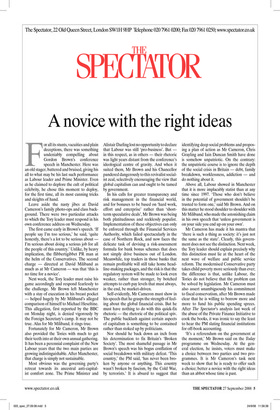A novice with the right ideas
For all its stunts, vacuities and plain deceptions, there was something undeniably compelling about Gordon Brown’s conference speech in Manchester. Here was an old stager, battered and bruised, giving his all to what may be his last such performance as Labour leader and Prime Minister. Even as he claimed to deplore the cult of political celebrity, he chose this moment to deploy, for the first time, all its most cunning tricks and sleights of hand.
Leave aside the nasty jibes at David Cameron’s family photo-ops and class background. There were two particular attacks to which the Tory leader must respond in his own conference address on Wednesday.
The first came early in Brown’s speech. ‘If people say I’m too serious,’ he said, ‘quite honestly, there’s a lot to be serious about — I’m serious about doing a serious job for all the people of this country.’ Unlike, by heavy implication, the flibbertigibbet PR man at the helm of the Conservatives. The second charge — directed at David Miliband as much as at Mr Cameron — was that ‘this is no time for a novice’.
Next week, the Tory leader must raise his game accordingly and respond fearlessly to the challenge. Mr Brown left Manchester with a stay of execution in his breast pocket — helped hugely by Mr Miliband’s alleged comparison of himself to Michael Heseltine. This allegation, first reported by the BBC on Monday night, is denied vigorously by the Foreign Secretary’s camp. It may not be true. Alas for Mr Miliband, it rings true.
Fortunately for Mr Cameron, Mr Brown also provided the Tories with much to get their teeth into at their own annual gathering. It has been a perennial complaint of the New Labour years that the two main parties are growing indistinguishable. After Manchester, that charge is simply not sustainable.
Most obvious was the governing party’s retreat towards its ancestral anti-capitalist comfort zone. The Prime Minister and Alistair Darling lost no opportunity to declare that Labour was still ‘pro-business’. But — in this respect, as in others — their rhetoric was light years distant from the conference’s ideological centre of gravity. And when it suited them, Mr Brown and his Chancellor pandered dangerously to this revivalist socialist zeal, selectively encouraging the view that global capitalism can and ought to be tamed by government.
In his calls for greater transparency and risk management in the financial world, and for bonuses to be based on ‘hard work, effort and enterprise’ rather than ‘shortterm speculative deals’, Mr Brown was being both platitudinous and recklessly populist. Implementation of these objectives can only be enforced through the Financial Services Authority, which failed spectacularly in the case of Northern Rock, and now faces the delicate task of devising a risk-assessment formula for bank bonus schemes that does not simply drive business out of London. Meanwhile, top traders in those banks that remain profitable will still take home headline-making packages, and the risk is that the regulatory system will be made to look even weaker, rather than stronger, by botched attempts to curb pay levels that must always, in the end, be market-driven.
Self-evidently, Mr Cameron must show in his speech that he grasps the strength of feeling about the global financial crisis. But he must have nothing to do with this quick-fix rhetoric — the rhetoric of the political spiv. The public backlash against certain aspects of capitalism is something to be contained rather than stoked up by politicians.
Nor should he back down an inch from his determination to fix Britain’s ‘Broken Society’. The most shameful passage in Mr Brown’s speech was his bogus conflation of social breakdown with military defeat. ‘This country,’ the PM said, ‘has never been broken by anyone or anything. This country wasn’t broken by fascism, by the Cold War, by terrorists.’ It is absurd to suggest that identifying deep social problems and proposing a plan of action as Mr Cameron, Chris Grayling and Iain Duncan Smith have done is somehow unpatriotic. On the contrary: the unpatriotic course is to ignore the depth of the social crisis in Britain — debt, family breakdown, worklessness, addiction — and do nothing about it.
Above all, Labour showed in Manchester that it is more implacably statist than at any time since 1997. ‘Those who don’t believe in the potential of government shouldn’t be trusted to form one,’ said Mr Brown. And on this matter he stood shoulder to shoulder with Mr Miliband, who made the astonishing claim in his own speech that ‘unless government is on your side you end up on your own’.
Mr Cameron has made it his mantra that ‘there is such a thing as society: it’s just not the same as the state’. Clearly, this government does not see the distinction. Next week, the Tory leader should explain precisely why this distinction must lie at the heart of the next wave of welfare and public service reform. The modernised Conservative party takes child poverty more seriously than ever; the difference is that, unlike Labour, the Tories do not believe that the problem can be solved by legislation. Mr Cameron must also assert unambiguously his commitment to fiscal conservatism, after Mr Brown made clear that he is willing to borrow more and more to fund his public spending sprees. After The Spectator’s analysis last week of the abuse of the Private Finance Initiative to cook the books, it was ironic to say the least to hear the PM slating financial institutions for off-book accounting.
‘It’s a referendum on the government at the moment,’ Mr Brown said on the Today programme on Wednesday. At the general election, he insists, voters must make a choice between two parties and two programmes. It is Mr Cameron’s task next week to show that he is ready to offer such a choice; better a novice with the right ideas than an abbot whose time is past.










































































 Previous page
Previous page